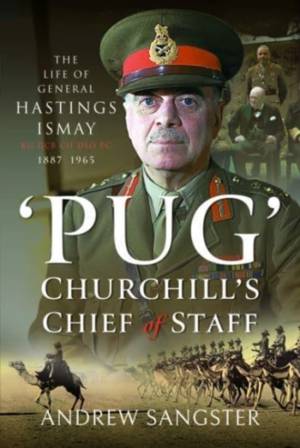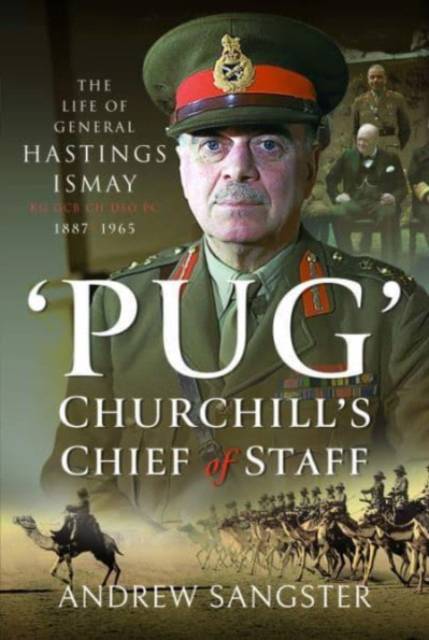
- Afhalen na 1 uur in een winkel met voorraad
- Gratis thuislevering in België vanaf € 30
- Ruim aanbod met 7 miljoen producten
- Afhalen na 1 uur in een winkel met voorraad
- Gratis thuislevering in België vanaf € 30
- Ruim aanbod met 7 miljoen producten
Zoeken
Pug - Churchill's Chief of Staff
The Life of General Hastings Ismay Kg Gcb Ch Dso Ps, 1887-1965
Andrew Sangster
Hardcover | Engels
€ 34,95
+ 69 punten
Omschrijving
A long overdue biography of Pug Ismay, Churchill's resident Chief of Staff throughout WW2.
General Hasting Ismay, invariably referred to as 'Pug', was one of the most intriguing, yet less well known, leading military characters of his era. This overdue biography describes how an officer who fought tribesmen in India and Dervishes in North-East Africa, thereby playing no significant role in The Great War, found himself as Winston Churchill's Chief of Staff throughout the Second World War.
In this hugely influential position, he eased the often fraught relationship between a determined and obstinate Prime Minister and his top military advisors. His tact and diplomacy were tested to their limits oiling the wheels with our American allies, both political and military, even those with Anglophobic tendencies. Based in 10 Downing Street, Pug accompanied Churchill on his overseas visits and to the major conferences.
Post-war Ismay assisted Mountbatten in the partitioning of the Indian sub-continent before becoming the first NATO Secretary General, a measure of the high regard the United States and other nations held him in.
Despite the influence he wielded during and after the Second World War, Ismay remains a mysterious figure who somehow managed to maintain the trust of those with whom he worked and dealt with under the most testing and stressful conditions. This insightful biography is a most welcome and valuable addition to the history of the period.
General Hasting Ismay, invariably referred to as 'Pug', was one of the most intriguing, yet less well known, leading military characters of his era. This overdue biography describes how an officer who fought tribesmen in India and Dervishes in North-East Africa, thereby playing no significant role in The Great War, found himself as Winston Churchill's Chief of Staff throughout the Second World War.
In this hugely influential position, he eased the often fraught relationship between a determined and obstinate Prime Minister and his top military advisors. His tact and diplomacy were tested to their limits oiling the wheels with our American allies, both political and military, even those with Anglophobic tendencies. Based in 10 Downing Street, Pug accompanied Churchill on his overseas visits and to the major conferences.
Post-war Ismay assisted Mountbatten in the partitioning of the Indian sub-continent before becoming the first NATO Secretary General, a measure of the high regard the United States and other nations held him in.
Despite the influence he wielded during and after the Second World War, Ismay remains a mysterious figure who somehow managed to maintain the trust of those with whom he worked and dealt with under the most testing and stressful conditions. This insightful biography is a most welcome and valuable addition to the history of the period.
Specificaties
Betrokkenen
- Auteur(s):
- Uitgeverij:
Inhoud
- Aantal bladzijden:
- 256
- Taal:
- Engels
Eigenschappen
- Productcode (EAN):
- 9781399045773
- Verschijningsdatum:
- 4/05/2023
- Uitvoering:
- Hardcover
- Formaat:
- Genaaid
- Afmetingen:
- 155 mm x 234 mm
- Gewicht:
- 564 g

Alleen bij Standaard Boekhandel
+ 69 punten op je klantenkaart van Standaard Boekhandel
Beoordelingen
We publiceren alleen reviews die voldoen aan de voorwaarden voor reviews. Bekijk onze voorwaarden voor reviews.











